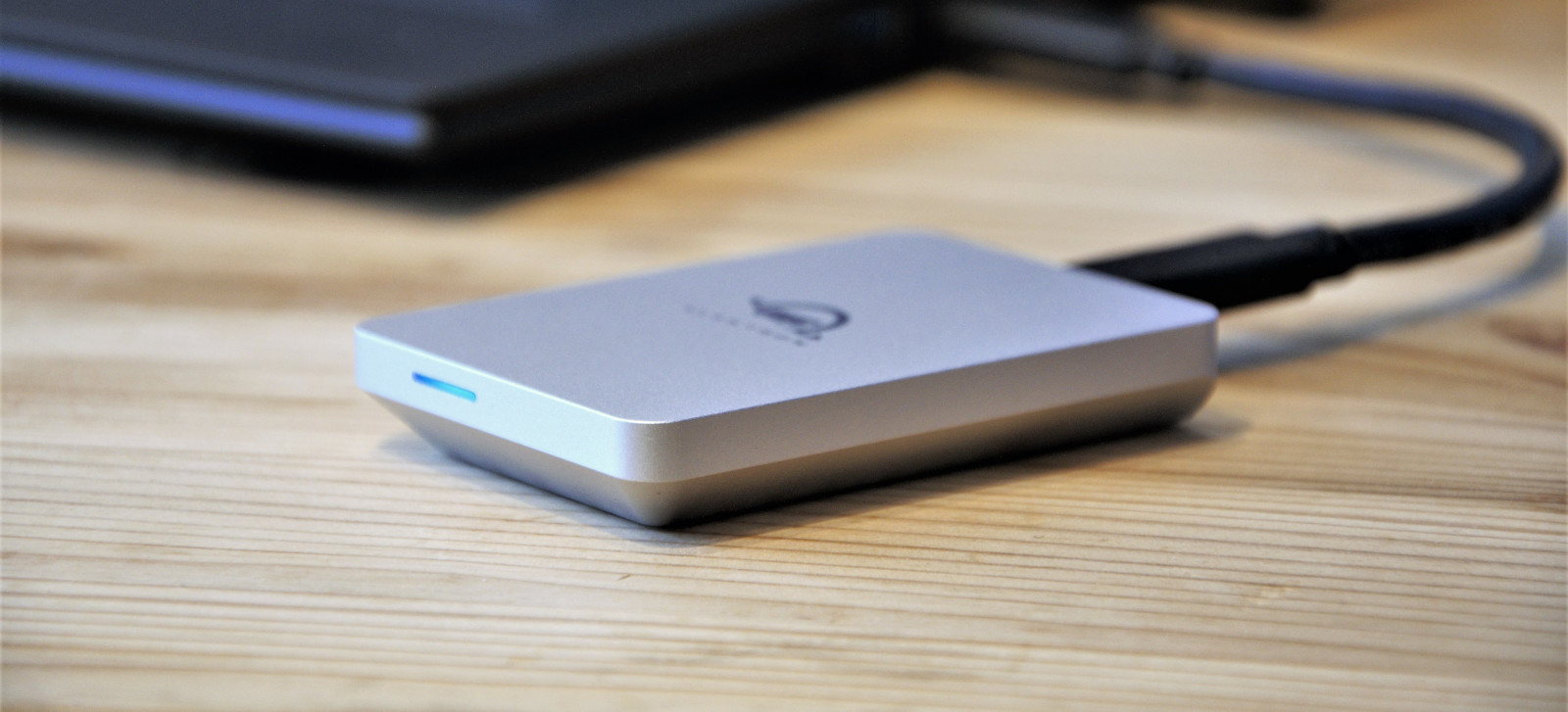TechRadar Verdict
The silver aesthetics might be playing to the Apple crowd, but anyone with a Gen 2 Type-C ports would appreciate one of these. It's portable and highly robust, but you pay for the pleasure.
Pros
- +
Crushproof, dustproof, and waterproof IP67
- +
Hardware encryption
- +
Good performance
Cons
- -
Expensive
- -
You need a compatible device to benefit from the speed boost
Why you can trust TechRadar
Other World Computing, Inc. (OWC) has a reputation of delivering well-engineered hardware that exploits their technology effectively while having a distinctive visual flair.
Many associate OWC as an Apple supporting hardware maker, but with the evolution of USB and the wider acceptance of Thunderbolt technology in the PC market, its products are more popular than ever.
Today we’ll be looking at its latest external SSD, the Envoy Pro Elektron, a solution that targets PC laptop users more than MacBook owners.
Price and availability
The Envoy Pro Elektron comes in four capacities that start at 240GB and include 480GB, 1TB and 2TB options. European pricing on OWCShop is €82.17, €123.67, €165.17 and €306.27 respectively, all exclusive of VAT.
US customers can find them on Macsales.com for $99, $149, $199 and $369.
Wherever you purchase it, the Envoy Pro Elektron is expensive irrespective of capacity, being even more expensive than some of the Thunderbolt 3 SSDs that support even transfer speeds.
For those curious, the best value is offered by the largest 2TB capacity, and the worst by the smallest 240GB, with the drives between getting progressively better.
- Also check out our roundup of the best external hard drives
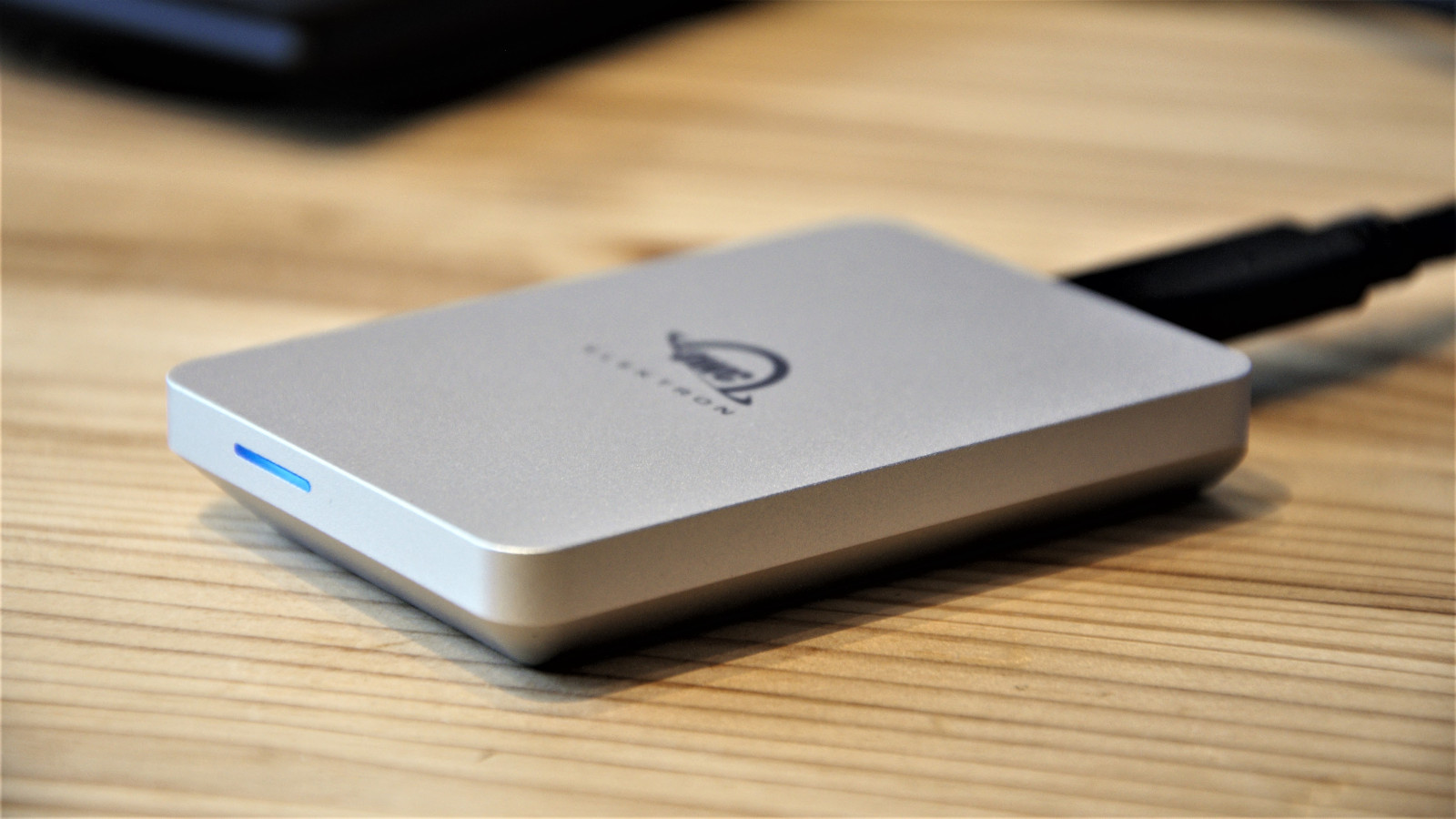
Design and features
The design ethos that OWC has championed has a minimalist foundation, and the Envoy Pro Elektron doesn’t stray from that path.
Handling it for the first time, the weight and thickness of the aluminium block that it is milled could easily be mistaken for being completely solid.
The underside is heavily chamfered on three sides, leaving only the end where the USB-C cable connects untouched. The opposite end has a small activity LED, and other than the OWC Elekton branding and rubber feet, those are the only external features.
Included in the box is a 20cm long cable with a converter that allows it to be used with either a USB-C or conventional USB-A port. But, it is worth noting that you won’t get the best performance out of this hardware without USB 3.2, previously designated as USB 3.1 Gen 2.
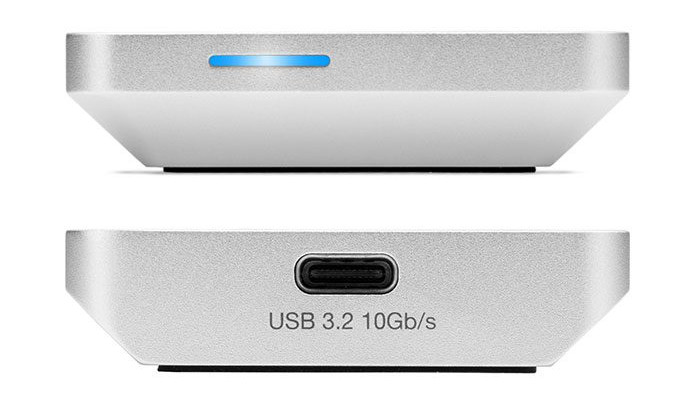
What it is difficult to assess from our photos is the scale of the Envoy Pro Elektron, as it is much smaller than many might assume.
At just 7.6 cm long, 5.2 cm wide and 1.2 cm thick, this is one of the smallest external SSDs we’ve seen, especially with this level of performance. And, weighing just 85g makes it remarkably portable.
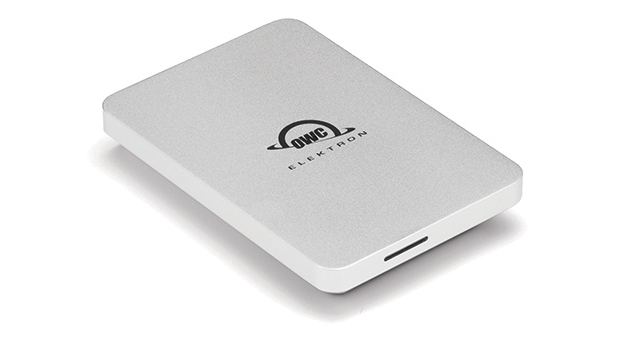
The milled-from-metal construction also imbues the Elektron with a high degree of damage resistance. OWC describe it as ‘crushproof’, and they have also had it IP67 rated for dust and water resistance.
The definition of IP67 is ‘Protected against the effects of temporary immersion between 15cm and 1m. Duration of test 30 minutes’. We didn’t test this aspect to destruction, but OWC offers a three-year limited warranty for those drives that can’t handle user abuse within these parameters.
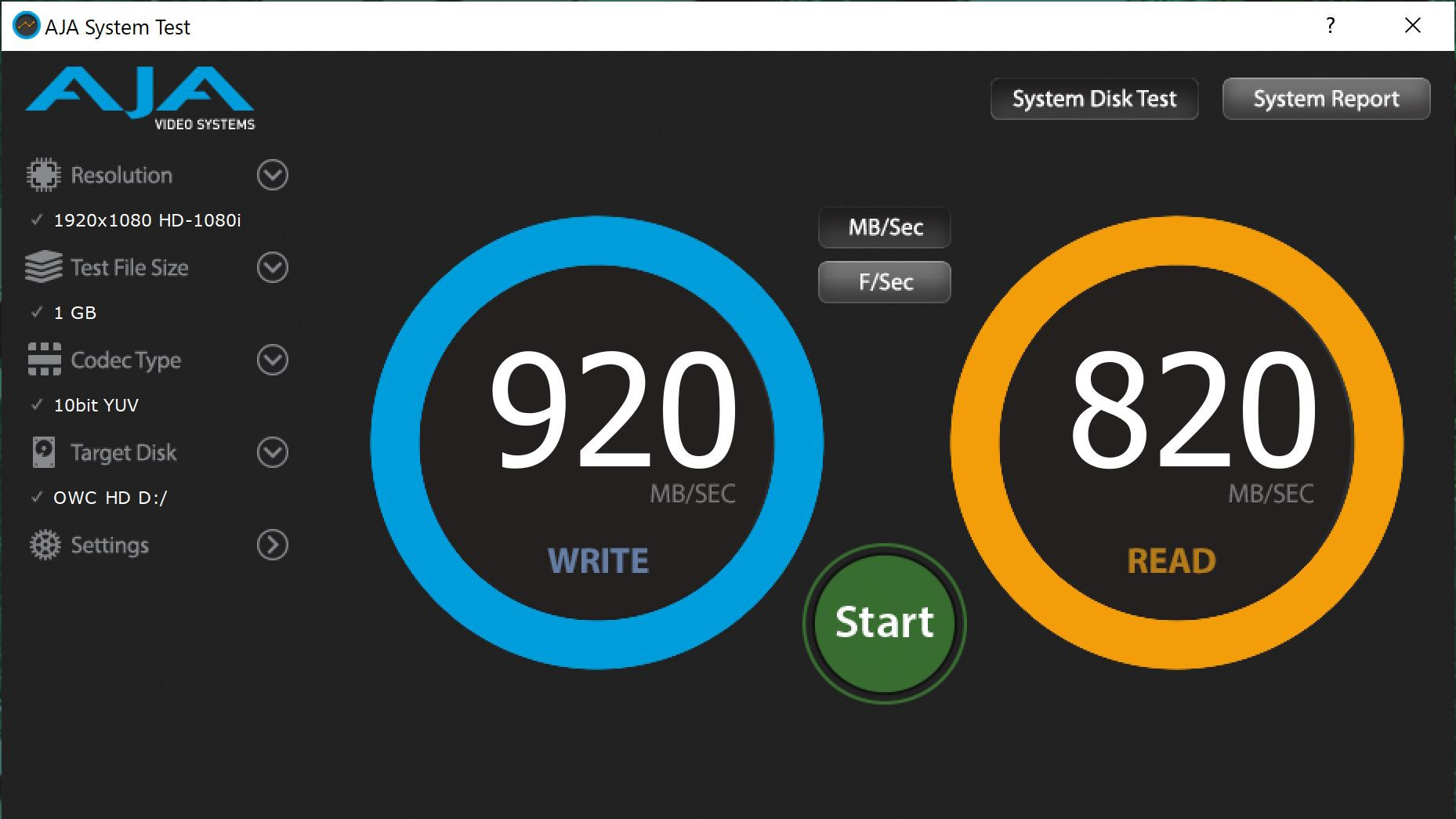
Hardware and performance
Under the skin, this drive uses the Asmedia ASM-2362 controller that creates a bridge between USB 3.2 and the Aura P13 NVMe M.2 2242 SSD NAND module.
In theory, this module could be replaced, but getting inside might need the deployment of power tools in a way that might rapidly void the warranty.
The issue that is common to this, and numerous other high-performance NVMe-based drives, is that without the right port to connect much of its speed is negated.
Without a 10Gbit/s USB 3.2 (or 3.1 Gen 2) or Thunderbolt 3 port that can downgrade to USB 3.2, the drive will connect at only 5Gbit/s. The reduction in bandwidth will reduce the read and write speeds to a maximum of 500MB/s, won’t achieve the 1,000MB/s headline speeds.
Because the physical ports appear identical, many users have purchased drives of this specification and then wondered why they don’t run nearly as quickly as advertised.
Here’s how the OWC Envoy Pro Elektron portable SSD performed in our suite of benchmark tests:
CrystalDiskMark: 953MBps (read); 966MBps (write)
ATTO: 967MBps (read, 256mb); 994MBps (write, 256mb)
AS SSD: 865MBps (seq read); 897MBps (seq write)
AJA: 820MBps (read); 920MBps (write)
But this isn’t the only caveat, as external speeds are dependent on the internal drive performance of the computer it is connected.
Those with a SATA SSD or conventional hard drive won’t see the transfer performance they expect because their internal drive becomes the bottleneck.
For those with the right ports, the Envoy Pro Elektron is fast by USB standards, but faster external drives exist for those that use Thunderbolt 3.
On our test system under CrystalDiskMark 7 a read speed of 953MB/s and write of 966MB/s were recorded, and these results were generally supported by AJA System Test, ATTO and AS SSD.
These scores were in line with our expectations, and running them repeatedly revealed a variance of around 50Mb/s between the best and the worst in each test.
The competition
The competition in this sector is hotting up, as the cost of NAND falls and external drive makers wake up to the possibilities.
A classic example of the drives that are now appearing is the Sabrent Rocket XTRM-Q, a similarly priced product to the Envoy Pro Elektron that lacks the robustness, but uses Thunderbolt 3 technology be almost twice the speed.
If resilience is an important aspect, comparable speeds to the Elektron can be found in the Crucial X8. It costs just £130 ($149) for the 1TB model, making a substantial saving over the OWC option.
For those with spare M.2 NVMe drives sat around, USB 3.2 specification enclosures can be found for less than $25 from many vendors as the cheapest option.
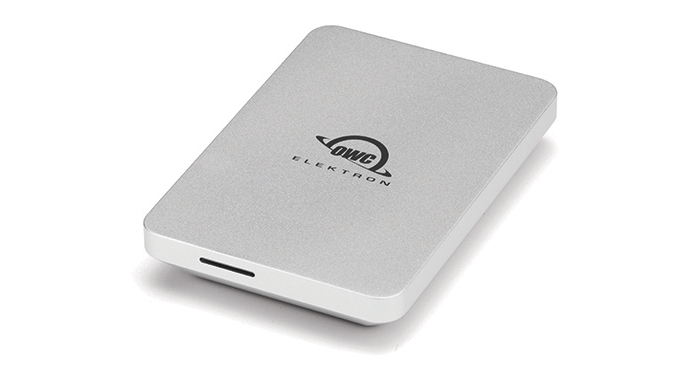
Final verdict
Let’s cut directly to the chase, and say that we love the styling, the very high quality of the engineering and finish, its robustness, portability and solid performance. All those things are admirable, and we salute OWC for such single-minded design endeavours.
The problem, especially for those that pay for their equipment, is the price.
We can see a perfectly reasonable argument that could be made to say you only get all of that beautiful quality engineering at its true cost, but that doesn’t make the hole in our bank account any more palatable.
With the Crucial X8 1TB costing almost two thirds the price of the same capacity Envoy Pro Elektron while being nearly as robust, customers might think twice. The only aspect that the OWC product has over the X8, other than styling, is an IP67 rating, making it somewhat resistant to water.
How often your equipment gets wet might bend purchasing decisions in its direction, but not all users will consider it a deal-breaking requirement.
For those that are happy to invest this much and a suitable port, surely a Thunderbolt 3 external drive would be the smarter choice?
Overall, the OWC Envoy Pro Elektron is a gorgeous piece of equipment that most would love to own, but not all could afford this level of quality.
- We've also highlighted the best portable SSD
Mark is an expert on 3D printers, drones and phones. He also covers storage, including SSDs, NAS drives and portable hard drives. He started writing in 1986 and has contributed to MicroMart, PC Format, 3D World, among others.
